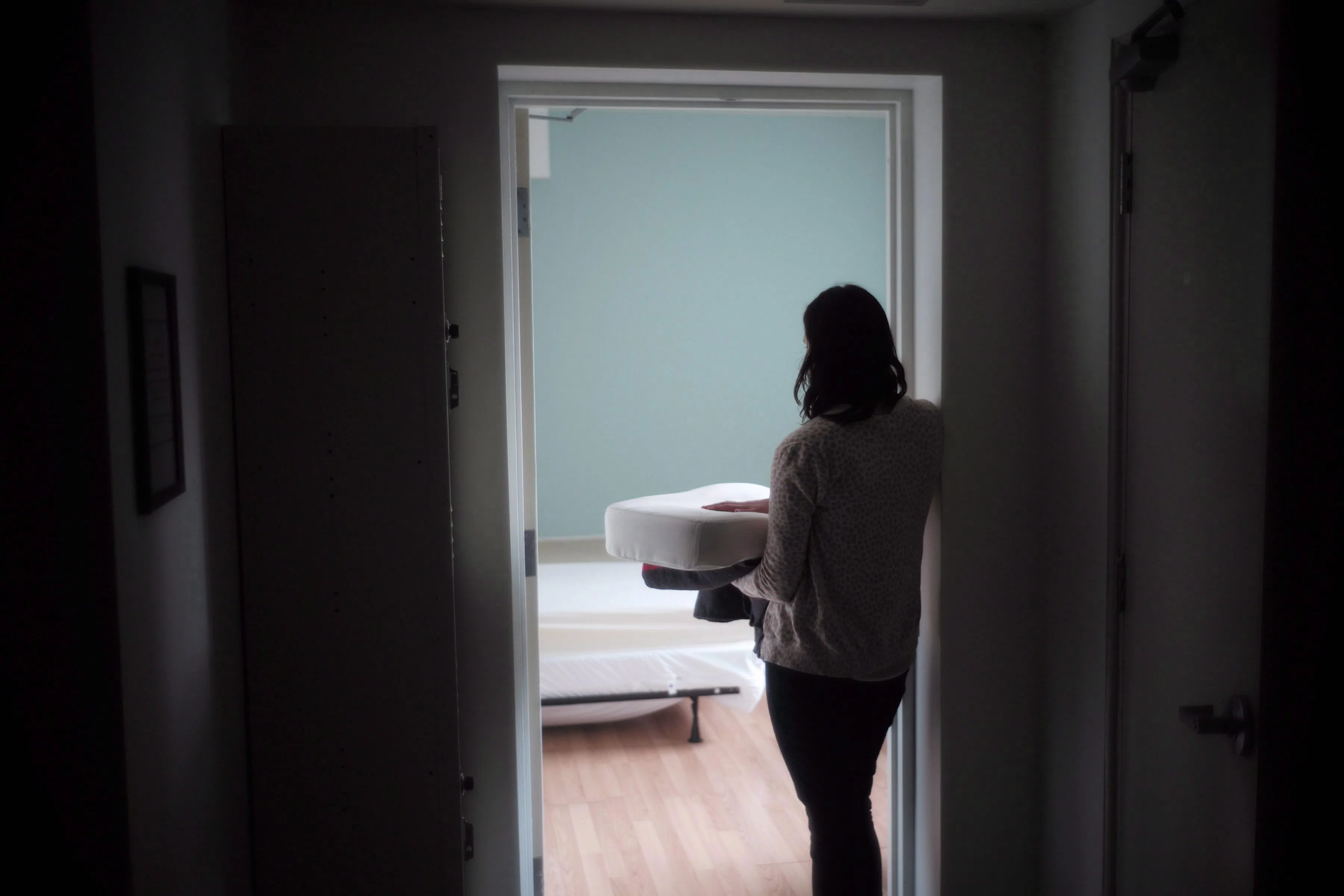Saskatchewan, which already has the highest rate of family violence and intimate partner violence in Canada, has seen yet another increase in these crimes, according to RCMP.
Figures released by Saskatchewan RCMP this week show calls reporting these types of crimes have increased by 13 per cent over the past five years, and in 2023 more than half of the violent crimes dealt with by RCMP jurisdiction were related to offences against intimate partners or family members.
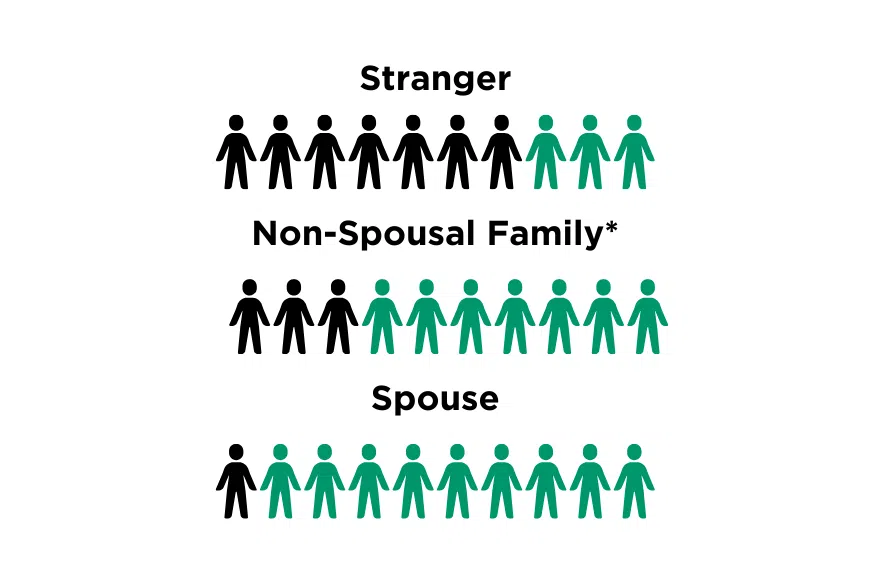
Partner violence by relationship 2022-2023. (Visual by Céline Grimard/650 CKOM)
Read More:
- Province provides funding to support family violence outreach program
- ‘Our youth are our future’: Emergency safe home opens on Sask. First Nation
- Violent crimes on the rise in Saskatchewan: RCMP
Intimate partner violence can be physical, sexual, emotional, spiritual, neglect or financial, among other things, and is a pattern of abuse where one partner controls the
other through force, intimidation or threats.
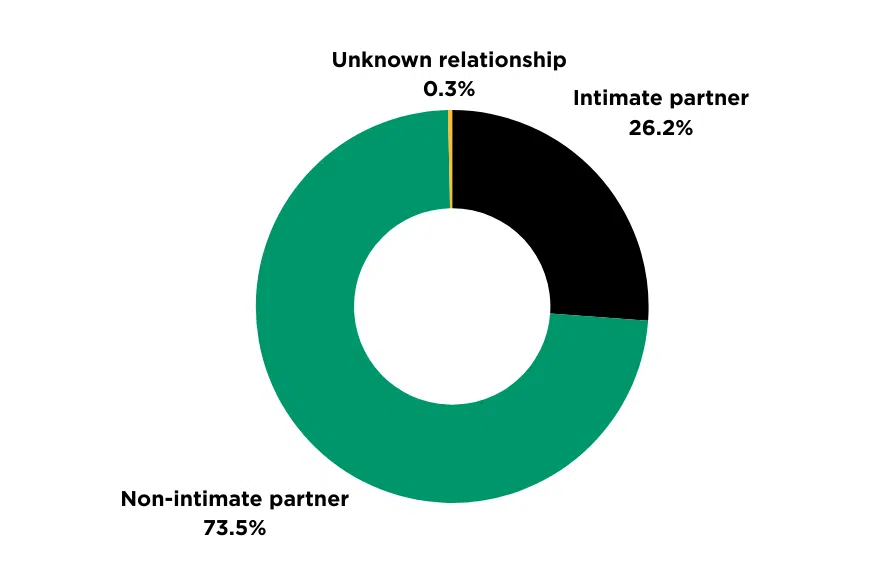
Relationship of accused to victim in partner violence for 2023. According to the RCMP data those aged 25 to 44 have the highest cases. (Visual by Céline Grimard/650 CKOM)
*Non-Spousal family definition:
Includes victims of all non-spousal family members related by blood, marriage (including common-law) or adoption. Examples include parents, children, siblings, grandparents, uncles, aunts, cousins and in-laws.
Family violence is a broader category, RCMP says, but includes the same type of abuse inflicted on a spouse, parent, step-parent, sibling, child or other relative.
Intimate partner violence is considered a major global public health concern by the World Health Organization (WHO), which says it can result in immediate and long-lasting health, social and economic consequences.
Although this type of crime can impact people of all genders, ages, socioeconomic, racial, educational, ethnic, religious and cultural backgrounds, women account for the vast majority of people who experience it. RCMP only recognizes two gender categories in its statistics.
RCMP officers police 46 per cent of Saskatchewan’s population but also cover over 99 per cent of the total geographical area.
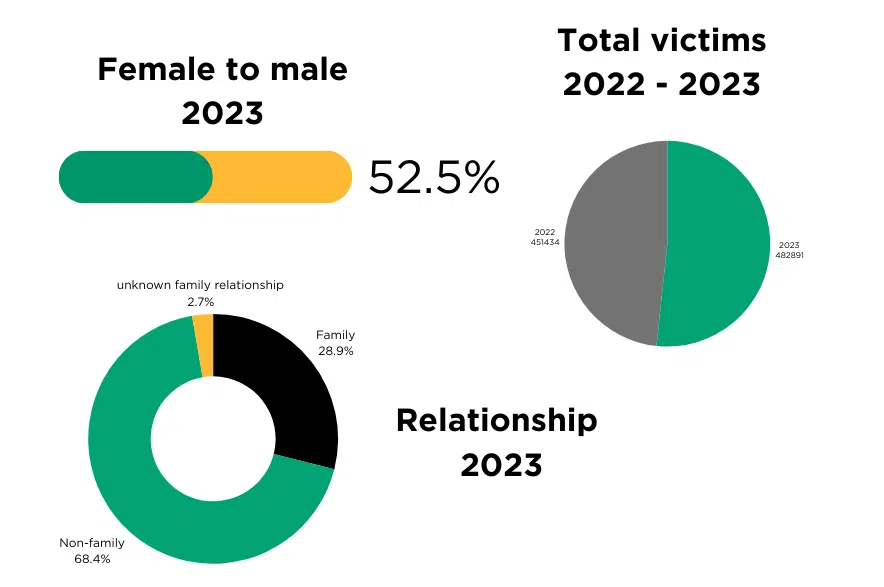
Family violence total victim count overview. (Visual by Céline Grimard/650 CKOM)
Assistant Commissioner Rhonda Blackmore, Commanding Officer of the Saskatchewan RCMP, says that means the force deals with about 60 per cent of the Criminal Code violations in the province, as well as 65 per cent of all violent crimes.
Along with the increase of 13 per cent, RCMP said in the regions it covers it saw increases of 19 per cent in the Central District, 14 per cent in the North District, and 7 per cent in South District over the same period.
In 2023, that equates to an average of 813 calls a year to RCMP about intimate partner violence for every 100,000 people it polices and 890 calls about family violence rates per 100,000 people. Provincial policing records of these same types of crimes in 2023 were 710 and 741 per 100,000 people.
“Saskatchewan RCMP, together with our community partners, has an important role to play in educating the public about intimate partner violence and supporting victim safety,” said Sgt. Kim Stewart, Saskatchewan RCMP domestic violence co-ordinator in the news release.
In 2023, 26,777 children and youth (aged 17 years and younger) were victims of police-reported family violence. Of these, more than three in five victims (62%) were girls.
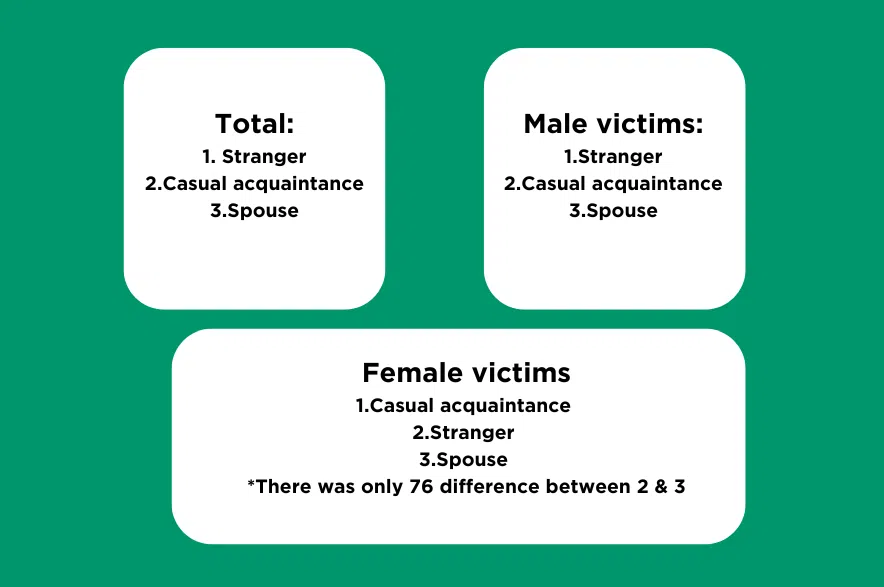
Family violence of relationship to victim in 2023. (Visual by Céline Grimard/650 CKOM)
How to get help for family or intimate partner violence
There are 18 helplines, both provincial and national, available in Saskatchewan to support people experiencing various forms of abuse and domestic violence. All are confidential, free, and available 24/7.
1. Naseeha Mental Health Helpline
- Support for everyone (Muslim and non-Muslim callers)
- Available via text or call 1-866-627-3342
2. Canadian Human Trafficking Hotline
- Confidential, multilingual service available 24/7
- Available via call at 1-833-900-1010 or online chat at canadianhumantraffickinghotline.ca
3. Canadian Resource Centre for Victims of Crime
- Support for victims, survivors, and their families
- Available via text or call at 1-877-232-2610, or online chat at crcvc.ca
4. First Nations and Inuit Hope for Wellness Helpline
- Support for Indigenous people
Available via call at 1-855-242-3310 or online chat at hopeforwellness.ca
5. 24-Hour Residential School Crisis Line
- Support for those affected by residential school trauma
Available via call at 1-866-925-4419
6. NISA Helpline
- Faith-based support for parents and women
- Available via call at 1-888-315-6472
7. LGBT National Hotline
- Support for the LGBTQ2S+ community
- Available via call at 1-888-843-4564 or online chat at lgbthotline.org
8. Kids Help Phone
- Multilingual service for young people
- Available via text or call at 1-800-668-6868 or online chat at kidshelpphone.ca
9. Youthspace.ca
- Crisis and emotional support for people under 30
Available via text at 778 7830177 or online chat at youthspace.ca
10. Shelwin House 24-Hour Support
- Support for women
- Available via Call at 1-306-244-7773
11. Saskatoon Crisis Intervention Service
- Support for everyone
- Available via call at 1-306-933-6200
12. Crisis Suicide Helpline
- Support for everyone
- Available via call at 1-833-456-4566
13. North East Outreach and Support Services
- Support for everyone
- Available via call at 1-306-752-9463
14. Southwest Crisis Services Crisis Line
- Support for everyone
Available via call at 1-306-778-8383
15. Farm Stress Line
- Support for everyone, especially those in farming communities
◦ Available via call at 1-800-667-4442
16. Mobile Crisis Line
- Crisis support for everyone
- Available via call at 1-800-607-0310
17. Talking Stick
- Anonymous online chat support for Indigenous people
- Available via online chat on a free app only, available for Apple and Android
18. Child Abuse Line
- Support for children and youth
- Available via call at 1-800-387-5437
NOTE: This information was current in November 2024. If you have a service you would like added to our list please send details here.
Read More:
